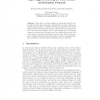911 search results - page 47 / 183 » The Semantics of Event Prevention |
104
click to vote
ICPR
2006
IEEE
15 years 11 months ago
2006
IEEE
This work presents an automatic technique for detection of abnormal events in crowds. Crowd behaviour is difficult to predict and might not be easily semantically translated. More...
ADBIS
2009
Springer
15 years 4 months ago
2009
Springer
Abstract. Being able to activate triggers at timepoints reached or after time intervals elapsed has been acknowledged by many authors as a valuable functionality of a DBMS. Recentl...
COLING
2008
14 years 11 months ago
2008
Addressing the task of acquiring semantic relations between events from a large corpus, we first argue the complementarity between the pattern-based relation-oriented approach and...
ENTCS
2006
14 years 9 months ago
2006
Executing concurrent specifications on sequential hardware is important for both simulation of systems that are eventually implemented on concurrent hardware and for those most co...
CORR
2009
Springer
14 years 7 months ago
2009
Springer
Transactional events (TE) are an extension of Concurrent ML (CML), a programming model for synchronous message-passing. Prior work has focused on TE's formal semantics and it...

